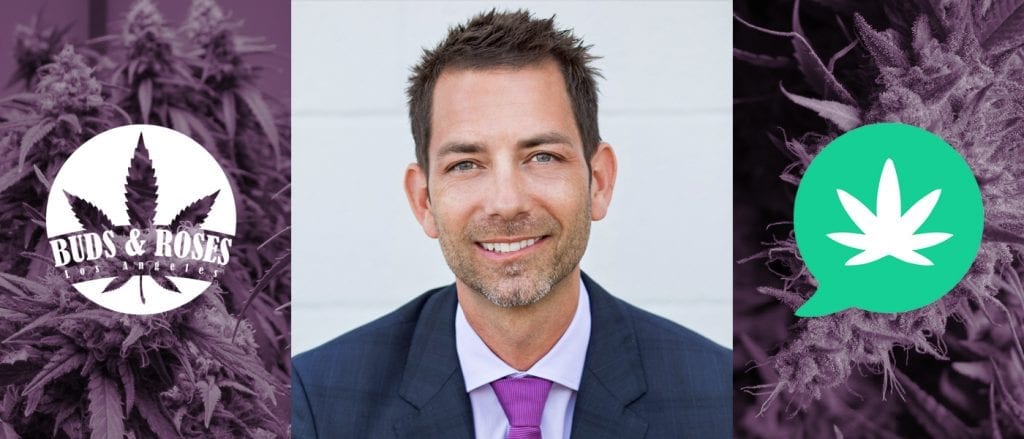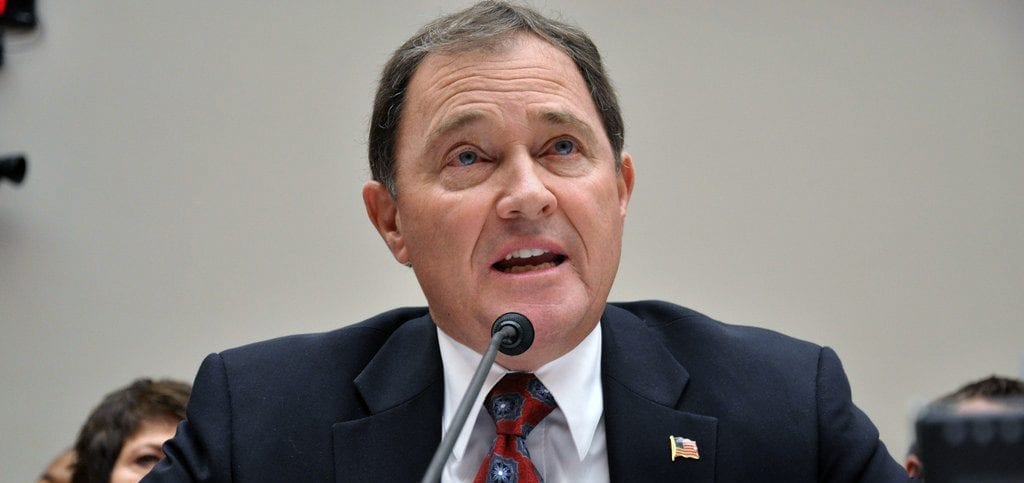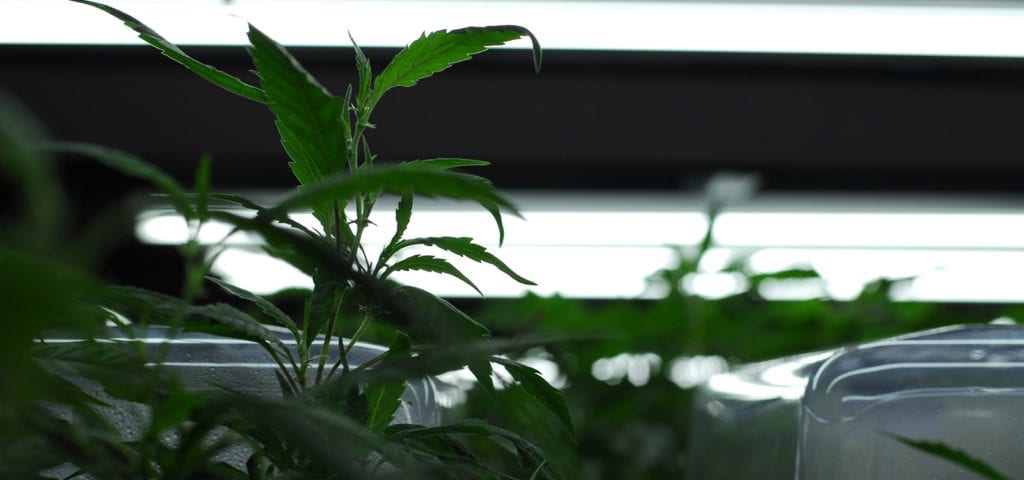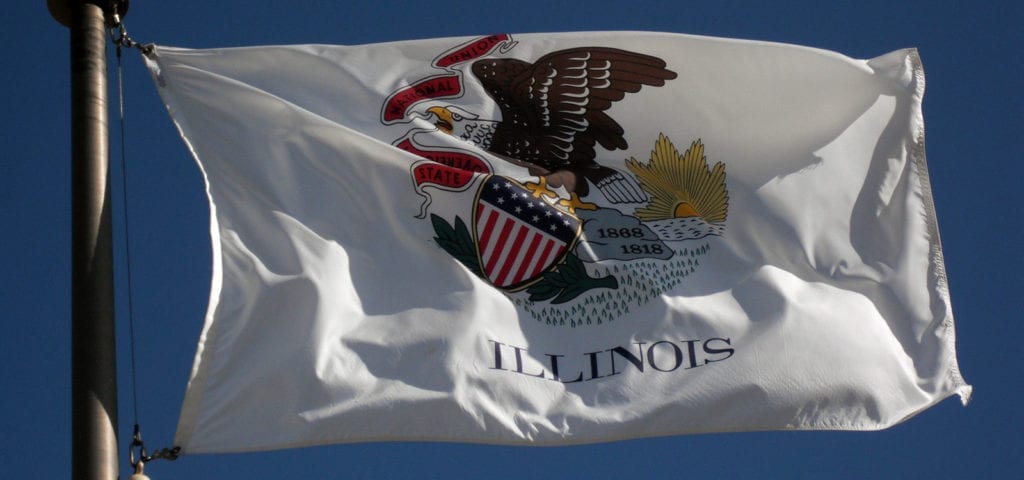Aaron Justis is CEO of Buds and Roses, a seasoned medical cannabis dispensary in the Studio City neighborhood of Los Angeles, California.
In this podcast episode, Aaron hosts Spark the Conversation‘s Bianca Green for a conversation inside of the Buds and Roses dispensary location. This interview was recorded during the Spark the Conversation bus tour last fall, before California had officially voted to end the prohibition of cannabis.
The interview covers the scope of Aaron’s cannabis career, which began with the leap of faith of uprooting from Illinois to move to California and join a technically illegal industry, as well as his many long-term activism efforts. Though this conversation technically took place during the Spark the Conversation bus tour last fall (before California voters approved Prop. 65 to legalize adult-use cannabis), we hear from Aaron about his predictions for the L.A. cannabis market and he offers his input on what qualities are most important for an entrepreneur entering the cannabis space.
Tune in below, or scroll further down to read a full transcript of the interview.
Subscribe to the Ganjapreneur podcast on iTunes, Stitcher, SoundCloud or Google Play.
Listen to the podcast:
Read the transcript:
Bianca Green: Welcome to the Spark the Conversation podcast, in partnership with Ganjapreneur.com. I’m your host, Bianca Green. Today, I get to sit down with my good friend, Aaron Justis, of Buds and Roses in Studio City, a dispensary that’s existed since I’ve been in the game, so over eight years. I’ve known Aaron for many years. He was always a participant in the Cannabis Cups so I got to know him and his family there.
Then I always saw Aaron in DC and Sacramento, so he was one of the very, only people, really, that I would always see at both places. You know, in advocacy and in the competitive side of the cups. I’ve always had a kin toward him because he participated in being a part of the change. He’s the CEO of Buds and Roses and has strains that they developed there. It’s one of the nicest dispensaries I’ve been in. It’s just a really upscaled, beautiful, really comfortable environment that a lot of clientele that’s in that area are very comfortable going to.
He really did a lot to change the stigma of how people get access to their medicine and I admire him for a lot of his work. I’m really excited to talk to him today about his entrepreneurialism and kind of see where he’s at. One of the things that I think that we’re looking at achieving with this podcast is getting information out there to people so they understand what’s going on. What some of the things people have been up against running businesses and how to be responsible through advocacy, as well as being an entrepreneur.
Hearing from him and some of our other guests that are going to be throughout this podcast I think are going to be really exciting because some of these people are the pioneers and it’s really good information so I’m glad to have everybody with us today.
Hi, Aaron. We’re here today with Aaron Justis of Buds and Roses. Good to have you. Thank you so much for being here.
Aaron Justis: Thank you for having me.
Bianca Green: Aaron and I have known each other for quite some time, right? I met you, I think the first time I met you was at a AC Unity Conference in DC when we went to lobby but one of the interesting things about you, Aaron, is that I always saw you at a time when it wasn’t really popular being at the cups as a vendor and then also as an advocate in DC and Sacramento.
There were very few people that I saw on a crossover and so I’ve always had a camaraderie with you based on that and just watching your business flourish. You going from your first location down the street and now being in this awesome location, I’m really proud of everything that you’ve done with Buds and Roses and the way that you’ve kind of branded yourself and put yourself out there as a leader in the community.
Aaron Justis: Wow, thank you.
Bianca Green: Yeah.
Aaron Justis: Thank you. That’s awesome.
Bianca Green: Yeah. I guess one of the things we should really start talking about is how did you get into the industry?
Aaron Justis: Let’s see. I can go really far back and, when I was probably 15 is when I first got in the industry, but I started really using cannabis when I was 17 for what I later found out to be medical purposes. I didn’t really know why I was using it at first but I knew I liked it. When I was about 19, I read Jack Herer’s book The Emperor Wears No Clothes and it just totally blew me away how cannabis, just the lies that we’re told to make cannabis illegal and then the effect that that has on so many people in so many communities and the damage that it does.
It put a fire in my belly and I went and attended my first NORML conference I think in 1998, actually met Jack Herer and spent a little time with him and, from there, just kind of got into it and did what I could legally in the cannabis business, which was started a hemp clothing company and just promoted cannabis and kind of like sparking the conversation back then by having shared such a set like marijuana medicine shop or save the planet but cross the E out so it’s like save the plant and kind of just did that and started going to High Times Cannabis Cups but they were only in Amsterdam then. Yeah, that’s kind of how I got in.
Bianca Green: You’ve been a huge winner at these cups. I mean, you showed me a cannabis cup medal that you guys won in what year? Were you filming your garage?
Aaron Justis: Yeah, in like a ’98, I had a booth selling my hemp clothing and we brought hemp sweaters and hemp gloves that year and it was so cold in Amsterdam, like everyone just bought them up and so I won a Cannabis Cup award for best new hemp product.
Bianca Green: That’s awesome.
Aaron Justis: Yeah, it was great. It was very motivating, for sure.
Bianca Green: Yeah, and then how did it evolve into becoming a club owner?
Aaron Justis: I always remained an activist. I did some lobbying with Illinois NORML for a while and then I just kind of stepped back a little bit. You couldn’t make a lot of money selling hemp clothes and going to these festivals but I met a lot of people and it was fun. But I have a family to focus on then and now and I did other retail businesses but I just wasn’t feeling it. You know, I wanted to do something more important. I wanted to do something that could change the world for the better.
I remember one day, about eight or nine years ago, watching Marijuana Inc. on CNBC and I remember I saw Richard Lee on there and I remember when he just said, the interviewer asked him, “So, do you feel like you’re illegal business?” He said, “Well, I paid over $500,000 in federal taxes last year so, you know, I feel like I’m legal. They’re taking my money and I pay state, you know, local taxes,” and just a light bulb went off and I was like, “Oh, my God. There’s a real cannabis industry in California and I have to go there and be a part of it.”
Bianca Green: Wow, so you like picked up your family from Chicago and moved out here? Tell me what that journey was like?
Aaron Justis: Yeah, so I remember I told my wife. I was like, “Hey, we’re moving to California and I’m getting in the cannabis industry.”
Bianca Green: Erica’s like, “What?”
Aaron Justis: Yeah, yeah. She said, “Okay.” Then, later that night, and she’s not very emotional. She doesn’t cry a lot, almost never, and I noticed she was crying and I said, “What’s going on?” She said, “Well, you said we’re going to move to California and I think you’re serious and I’m just like trying to process this,” and she said, “But you know what? You go out there and make it work and I will … We’ll, we’ll come out there afterwards.”
Jumped on a plane with my best friend Tyler Wadleigh who is still our head cultivator and we just flew out to California and we’re just like, “How are we going to get in this industry?” I started by going to Oaksterdam University. There was one in Beverly Hills at the time. I met Jeff Jones, Dale Sky Jones, and they gave me some good advice and then I started going to ASA, Americans’ for Safe Access events and I ran into Steve DeAngelo and Don Duncan and I just met all these great people.
Bianca Green: Who are great drug policy reform advocates. All of them.
Aaron Justis: Yeah, and they do it the right way, you know?
Bianca Green: Yeah.
Aaron Justis: I just said, “Hey, I have to get a dispensary here. What can we do?” I actually looked in Washington, DC where there were some opportunities and LA, but LA is where I wanted to be. It was where I wanted to live and grow a business and we ended up with Buds and Roses in about a year.
Bianca Green: The name. I love the name. How did the name come about?
Aaron Justis: I actually didn’t come up with the name. I took over Buds and Roses in 2010 and it was a very unknown dispensary. They didn’t have a lot of patients. I think the annual sales in 2009 were $40,000 for the year and there was only one employee, the lady who started it, and she just came up with the name and the thing is that I remember, when I first became the president and got on the board, I said, “You know, we can’t use this name because it’s not medical enough. We’re going to get raided. We need to be like Los Angeles Patient Center or Care Center.”
Bianca Green: Sure, yeah.
Aaron Justis: But the thing is people just kept coming in and they’re like, “I love this name. I love this name.”
Bianca Green: Yeah.
Aaron Justis: You know, things were good. We didn’t get raided the first year or two and we thought, “Okay, we have to start like promoting this.” I remember, even when we first started promoting it, we would put like Buds and Roses really little and then collective really big because we were trying to get people to focus on the word collective like, you know, because we are a state non-profit and we do operate as a collective. As we started growing the business and winning awards and things like that, we just kind of redesigned the logo and ran with it.
Bianca Green: Well, it’s worked for you. You know, one of the things that you guys did really well for your branding was you made … Erica made those great clothing lines, right? You would give those out at the cups and a lot of people wore those. I mean, we gave them to John Sally. Who else has worn them that’s gotten it out there?
Aaron Justis: Yeah, just a lot of good people. I’ve worn it and they loved just kind of the brand and it stands for something.
Bianca Green: Yeah, and you have a really big celebrity clientele out here. That is obviously really good for marketing and branding. The idea that you guys built the clothing line out as a separate entity, though, was a really smart move, especially to solidify your intellectual property, right?
Aaron Justis: Yeah.
Bianca Green: It gives you the opportunity to trademark in certain areas where you still can’t trademark strains and things like that. Why don’t you talk a little bit about that?
Aaron Justis: Yeah, like one of the only ways to kind of trademark your dispensary, or if you’re creating products for the industry, is you can’t trademark cannabis specific so you want to come up with different things that you can trademark, so it is the clothing, it’s smoking accessories. We’ve had ash trays and doob tubes and things like that. Lighters can even be trademarked. You can even turn your website, if it’s informational, into a trademark. You’re giving information on this site. You have to do a lot of workarounds to get the trademark going for when they do finally accept cannabis trademarks.
Bianca Green: That’s great. Good proactive ways to keep your intellectual property because now, even three years ago, when nobody was paying attention, there was a lot of opportunity but now people are coming in from all different angles and really just trying to suck up the IPs.
Aaron Justis: Yeah. I just saw a major lawsuit against one of like the world’s biggest corporations against somebody in the cannabis industry and they got almost half a million dollar judgment against this small cannabis company for using something with their logo. It’s these bigger corporations are also definitely starting to pay attention.
Bianca Green: And they’re creating laws. Like in Oregon, you’re not allowed to use Girl Scout Cookies. There’s been bans on using some of the other names, so it’s definitely growing up in how we look at it. I mean, I’ve always thought that if we sophisticated the way that we talk about cannabis, not only as a medicine but in the way that we brand it — you know, “AK47” — there’s just certain names that might intimidate a new consumer to kind of come on board and get with it.
Aaron Justis: Yeah, with the Girl Scout Cookies, I just have to say this. They actually sent me a cease and desist letter a few years ago.
Bianca Green: The Girl Scouts did?
Aaron Justis: Yeah, we had won in the US Cannabis Cup with Girl Scout Cookies and it wasn’t … We weren’t selling the seeds, we’re not the creator of it, we just grew it and won, and yeah, they sent me a letter and it just said like, “Stop using the name,” and I didn’t bring it up at the time. I’ve mentioned it since but the last thing I wanted was a fight with Girl Scouts of America.
Bianca Green: Girl Scout Cookies of America, oh, my God.
Aaron Justis: Just like that’s okay. It was actually the phenotype that we had is called Platinum Cookies so we actually had already changed it to that and we haven’t had any problems since.
Bianca Green: Do you do a lot of genetics here?
Aaron Justis: We have created some genetics in the past. It’s not something we’re working on so much now, but we have created strains like Joey’s Strain, which was created for Joey, who his mother started the Unconventional Foundation for Autism, Mieko Perez, and we have been donating medicine for Joey for a long time and then we just, we found a strain that we cultivated and bred that worked really well for him and that created Joey’s Strain.
Bianca Green: What’s that like? Like the pressure of literally creating a medicine for a child? That’s got to be an insurmountable amount of overtaking.
Aaron Justis: Yeah. You know, it wasn’t that we actually had bred a few different strains and then this one worked for him so we used to call it Alpha Dog and then it just worked so well for him we renamed it. Creating a strain for him would have been really difficult because everybody’s body is different and it wasn’t … It’s not CBD that works for him. It’s THC. Then it’s just I guess finding the terpenes and things like and the combination of cannabinoids in that strain just happens to work really well for him, so kind of lucked out, I guess.
Bianca Green: How does that even work? Like you become then a scientist, in a way.
Aaron Justis: Yeah, and you never know if it’s going to work for everybody like that or if they’re going to have different reactions, so there’s just certain strains that we were providing for him where … and this has happened recently, if we don’t have the Joey’s Strain where he could take something and then he’s up for days. Like literally almost a week and then Mieko is up for almost a week. You definitely want to get the right medicine for people.
Bianca Green: Consistency is important, so I’m sure, as a business owner, it stresses you out that like, God forbid, you get shut down. People rely on their medicine from you in particular.
Aaron Justis: Yeah.
Bianca Green: Like what’s that like?
Aaron Justis: This does happen. Even if we don’t get shut down, the other problem is our providers who get shut down. One of my biggest things right now is trying to keep consistent product on the shelf. You know, when somebody finds something that works for them, it’s like, we don’t want to run out of that. They might come every three weeks, every four weeks, and sometimes drivers still get arrested, manufacturing facilities, cultivators, get shut down, and there’s a big lapse in product. There’s already, even in a market where people aren’t getting shut down, they’re really not able to produce as much as they’d like or as much as the demand is out there. In this industry, we’re constantly running out of products and not having consistency like we’d like.
Bianca Green: What’s the LA market like?
Aaron Justis: Well, it’s big. Probably the biggest in the country, if not the world, and they’re fairly sophisticated and educated. There’s been medical cannabis providers here for 10 years plus, maybe 12 years, and they definitely have … There’s probably 1,000 dispensaries that are operating outside of the little regulation that we do have here. People have a wide experience of it but it also is really like amateur, or it’s not what it could be because the regulations don’t exist. You hear officials all over Southern California and in California say, “Oh, there’s a problem with all these dispensaries. They’re an eye sore. They’re not really providing medicine. They’re doing this and that,” and I just feel like you can’t judge a marketplace when it’s unregulated. Of course, if bars were not regulated, things would be out of control.
Los Angeles has yet to see what a truly regulated market looks like and that’s kind of how we tried to operate because my mentors were Steve DeAngelo of Harborside, Don Duncan of LAPCG and other dispensaries. He started I think the first one in the state almost 20 years ago. Or Robert Jacob from Peace and Medicine. Just these pioneers, so even though we’re not regulated where we have to label things properly or it doesn’t have to have the nutrition facts and all that, doesn’t have to be lab-tested, we just push for those and set our own regulations.
Bianca Green: Yeah, the state of marijuana. Betty Yee spoke the state controller and she spoke about how the government essentially is listening because we’re the only industry that’s begging for regulation.
Aaron Justis: Right, yeah.
Bianca Green: Yeah, which is really interesting. I’ve met a lot of really good people in this industry that came from the movement. Tell me about, for you as a business owner who’s been a business owner for a while, watching the movement go into a real industry and what that feels like. I know that your business is striving but, at the same time, you’re working with political issues. Bans, Prop 64 that’s coming. How’s that going to change, you know, the future for you? There must be just a lot of nuances to your business that wouldn’t exist if you had a shoe store.
Aaron Justis: Yeah. I think a lot of industries deal with their own issues. Some of the stuff that we deal with is somewhat normal, just for a struggling business owner, but then some of the things we deal with are way beyond normal. The fact that we’ve survived through bans. There was a complete ban on dispensaries in LA. At this time, I’m worried about my home being raided, my dog being shot in front of my kids and all these things, just for providing medical cannabis. We’ve had to deal with that. We’ve had to deal with several bank accounts being shut down. Truly unfair tax laws where we can’t write off any expenses and we get audited and we owe hundreds of thousands of dollars, even though we didn’t make any money those years.
It’s definitely been difficult and also, just in LA alone, LA hasn’t regulated so there’s tons of work at the local level, at the state level, and at the national level that I just … I feel like, if we can get through these really difficult times, we should be able to get through anything but it’d be nice to kind of get going normally.
Bianca Green: Yeah. You did a lot of work with GLACA for local ordinance issues, with local ordinance issues. Tell me a little bit about that experience.
Aaron Justis: Yeah. We’re the oldest trade association of its kind. We’d been around for almost 10 years in Los Angeles and we’ve always tried to work with the city and create regulations in LA and push that and be a positive force and self-regulate our dispensaries as well and set up our own rules and regulations for that. This year has just been … It’s been interesting. There’s a couple of different groups of operators here that are somewhat legal. There’s two trade associations and our trade association took the view that the city just held off on regulations because the state never regulated. It’s such a big city they didn’t want to take on that task.
Going forward, this year, GLACA felt like we could work with the city. They were going to regulate. We didn’t have to be so forceful like we had been in the past. Maybe the other trade association was little more worried about how the city would react. We kind of both took our own angles on it but, as we kind of merge today, the city council’s going forward with it but our city is very diverse so they want to make sure that there’s room for minorities which is a trend in the industry which I think is extremely important to not cut the people that have been most affected by the war on drugs out of the legal industry, so it’s very positive to see that.
We want to get licensed for the activities we’ve been doing for almost 10 years here and we want to open it up so that the people that have been providing our dispensaries have the right to continue to operate as well. It’s definitely feeling very positive lately but we have just a ton of work to do.
Bianca Green: What do you think some of the greatest challenges have been for you, building this business?
Aaron Justis: I mean, probably the biggest thing is just it being illegal still and, even though, like when I say we’re somewhat regulated in LA, it basically says that all dispensaries are illegal but about 100 of us have limited immunity. We’re still not fully accepted by the law so we have a constant struggle with that. Then it’s just all the things of trying to build a business in a market like this, where you can’t get loans, you can’t get finance, investors are weary of what’s happening here.
Plus, I mean, look, 90% of the dispensaries in LA are operating outside of those regulations and that’s just a big competitive advantage for them, so it’s been hard to survive, especially when you’re being transparent and you’re doing things the right way when so many people are not. Again, I think if we can survive through this, it’ll make the future easier.
Bianca Green: What do you think is going to happen to the black market, though? These people who aren’t regulated, do you think that they’re going to get regulated and, if prohibition ends, what do you think that’ll look like?
Aaron Justis: I think that, if they over-tax it, that the black market can definitely thrive and stay strong, so we need to keep the taxes low. We already pay high taxes to our city, to the state, with the federal interference, we pay a lot of tax so we want to keep that low. I think the best way to build the legitimate market is to offer services and things that the black market just can’t. I believe, over time, people will see the value in going to a legitimate place versus the black market.
Bianca Green: Yeah, because customer service is really important. I mean, I’ve given you feedback on your business many times because I think that the consumer experience is what’s really been changing the game for a lot of people. I remember the first time I went to a dispensary and listening to the bars close behind you and you’ve got to walk into, “Eeeeng!” There’s this massive, like fear a little bit and you really make a wonderful consumer experience.
Aaron Justis: Thank you, yeah.
Bianca Green: I know Erica was a part of really spearheading creating the atmosphere in Buds and Roses and it’s really beautiful and warm and friendly, especially as like a single woman. I feel very comfortable coming in. It’s a very good customer experience, you know? That’s really important to draw in a new clientele, I think, right?
Aaron Justis: Yeah.
Bianca Green: What do you see the future of Buds and Roses being if legalization happens on November 8th?
Aaron Justis: Yeah. I mean, Buds and Roses is already moving forward with these huge law changes in medical cannabis and I think that, with Prop 64, legalization definitely looks like it’s going to pass. I think that’ll just continue to move everything forward. I mean, our goal is to kind of max out the licensing that you can get in California, which is three stores, manufacturing license, and a grow, and that’ll be really our big steps in the next five years.
But truly beyond that, my heart lies in cannabis cafes. I really want those in like every neighborhood on the plant. Wherever you can get coffee and fast food and alcohol, you should be able to get cannabis. That’s where I was really inspired in Amsterdam when I walked into a cannabis café. I mean, I love doing the retail thing, having dispensaries, and if I could have those all over, I want to do that too, but the cannabis cafés I’m really excited about. Giving people a place to socialize.
Bianca Green: Yeah, I think that that’s like the next thing, right?
Aaron Justis: Yeah.
Bianca Green: I mean, we know at cups, even at advocacy, everybody smokes, so having an experience with your fellow man is pretty much the thing that brings us all together, right?
Aaron Justis: Yeah, I think so. Yeah.
Bianca Green: How do you feel about cannabis? Like, what is it about the plant that drives you?
Aaron Justis: I love it. I mean, it really … First of all, it just works amazingly well with the body to kind of regulate yourself. If your stomach hurts, if you have a headache, like there’s all these normal things it can do to balance you out, but then it truly like gives me motivation and energy to do the tasks that I need to accomplish. It also just, it gets people thinking deep and talking about deeper conversations where, you know, I like alcohol but it has the opposite effect, you know?
Alcohol is a completely different substance. It’s not going to necessarily most of the time lead to any really productive, deep conversations, and I think that, through that, cannabis really changes people and ultimately changes the world. It changes their thoughts, which influence their behavior which will influence the world. It’s a great thing.
Bianca Green: What’s it been like being able to supply the medicine to patients for as long as you have so far? What are the most profound things that have happened to you as a business owner being able to provide safe access to this plant?
Aaron Justis: Well, you know, the biggest thing is that when I, before I had the dispensary, people look at people in cannabis look down on them. You’re not being praised. You’re not being thanked, and I open Buds and Roses, patients come in and people are literally like, people have grabbed me and said like, “You saved my life. Thank you for everything you do. I was taking all these pills and doing all this stuff.
Then like the next day a mom comes in and she’s like, “Thank you so much. My kids, they’re on the spectrum. I’m not, at this point, providing them with cannabis but I have to deal with my children and it’s very stressful and the doctor was giving me pills for that and now I’m using cannabis. Thank you so much.” It’s just like every single day, there’s praise, there’s love. I mean, it just feels so good to have a business that can make so many people feel happy.
I mean, the stories we hear are just, every single day, the things are amazing, how much benefit cannabis has brought to people’s lives. It’s so rewarding. I couldn’t think of doing anything else.
Bianca Green: You would say that’s one of the biggest rewards of owning Buds and Roses.
Aaron Justis: Yeah.
Bianca Green: Going through all the shit that you go through to keep it alive, yeah.
Aaron Justis: Yeah.
Bianca Green: What’s the future look like in 2017 for Buds and Roses?
Aaron Justis: Well, I think that 2017 is a year for us and myself to be really involved in the rules that are made. Yes, we’ve passed the legislation but now we have to pass the regulation, so I want to be as involved as possible throughout the process so that our patients, so that the laws are written in a way that benefits our patients and everybody.
Bianca Green: Is there any advice you have for any entrepreneurs that are coming into the industry that might want to be a dispensary owner?
Aaron Justis: Yeah. I would say that the first advice is that money won’t just fall out of the sky. Everybody thinks, “Oh, I’m gonna sell cannabis and I’m gonna be super rich.” It’s a competitive place. It gets more and more competitive so you definitely … Do what you love. I just believe that, if you do anything just for the money, it’s not going to work out so just make sure that you really want to provide medicine. You want to have a retail operation. I mean, look. You’re open every day of the year. You’re open late at night. Just retail in general has its own negatives that people kind of stay away from in the real world. It’s different than if you’re manufacturing your product. You’re not dealing with the same hours.
Just make sure you love it and do it right. Do something positive that people can be proud of. That’s what made us, gave us our reputation, and get involved with policies and advocacy because if you’re outside of the loop, then you’re just reacting all the time and you can’t really be prepared.
Bianca Green: Well, thank you, Aaron, for having us here today.
Aaron Justis: Thank you.
Bianca Green: And having the Spark the Conversation bus come to the store. It means a lot to us to be able to continue to change the stigma and for you guys to be a part of that is really empowering. Tell our audience where we can find you.
Aaron Justis: Yeah. Well, you can find us, if you’re here in California, you can find us on Ventura Boulevard in Studio City. It’s actually a neighborhood of Los Angeles so 13047, or you can check us out online. Facebook, Buds and Roses. Instagram, Buds and Roses. Everywhere, Buds and Roses.
Bianca Green: Awesome. Buds and Roses clothing, is that still …
Aaron Justis: That’s right, yeah.
Bianca Green: Is that still active?
Aaron Justis: Yeah.
Bianca Green: Okay, good. Awesome. Well, Buds and Roses, Aaron Justis, thank you so much. Let’s spark the conversation because it’s a joint effort.
Aaron Justis: That’s right.
Bianca Green: Spark the Conversation is really excited to do this partnership with Ganjapreneur.com, creating these podcasts. It’s a resource for cannabis professionals, advocates, patients, business owners, anyone, really, who’s in favor of responsible growth. Visit Ganjapreneur.com for daily cannabis news, career openings, company profiles, and of course, more episodes of this podcast. We’re thankful to them and the partnership that we have with them and we appreciate the fact that they sparked the conversation and help ganjapreneurs grow.

























